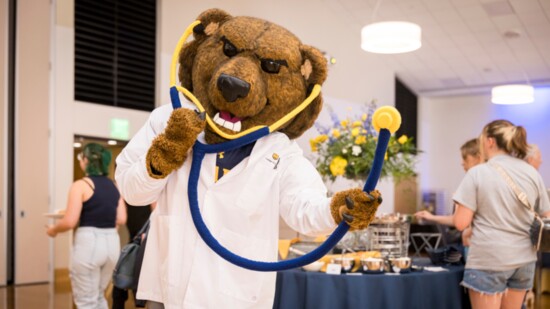Big things are happening at the University of Northern Colorado (UNC), and they’re about to get even bigger. UNC is on track to open its very own College of Osteopathic Medicine in Fall 2026—an exciting addition to the campus that’s set to shape the future of healthcare in Northern Colorado and beyond. Far more than just another institutional expansion, the College of Osteopathic Medicine marks a significant step forward for the university, the community and the region’s healthcare system at large.
This past September, UNC celebrated the groundbreaking of its new facility with spirited fanfare, marking a defining moment in the university’s history. As UNC President Andy Feinstein put it, "We’re answering a call to meet a workforce need, just as we did in 1889 when we opened our doors as a teacher’s college."
UNC is stepping up to address the critical shortage of healthcare professionals, and it couldn’t come at a better time.
If you’ve lived in Colorado long enough, you know that rural areas often struggle to get the healthcare they so desperately require. According to the Health Resources and Services Administration, Colorado is facing a dangerous shortage of physicians, with nearly 60 out of 64 counties in the state designated as "healthcare shortage areas." That’s where the new College of Osteopathic Medicine comes in to help.
Dr. Beth Longenecker, the founding dean of the College of Osteopathic Medicine, knows firsthand how vital this need is. Growing up in a small town in Pennsylvania, her father was an osteopathic physician who made a real difference in the community.
"I’ve seen the need for physicians in rural areas," Dr. Longenecker says. And that’s exactly why she’s so passionate about the work she’s doing at UNC. Hers is a drive laser-focused on training the doctors who will serve communities in need, especially in rural settings such as northern Colorado.
For UNC, launching a medical school is more than simply expanding the curriculum—it’s about building stronger, healthier communities. And with the opening of this new medical college, the university is positioning itself to play a fundamental role in the state’s healthcare future.
“This new college is going to be a huge economic boost for our community," President Feinstein explains. "Not only will it help address a critical need, but it will bring jobs, opportunities and growth to Weld County."
As the new medical school takes shape, it’s expected to generate around $500 million in economic impact for the county over the next 20 years. That’s a lot of new vitality, a lot of new students and a whole lot of new possibilities for the entire region.
What makes this medical college so unique? For starters, it’s designed to be a place where students aren’t simply learning how to be doctors—they’re learning how to care for the whole person.
"We believe in the osteopathic philosophy, which recognizes the mind, body and spirit," Dr. Longenecker says. "Our curriculum will focus on wellness, inclusivity and compassion, preparing students to be caring physicians who can truly make a difference in people’s lives."
The program will also emphasize health equity, diversity and community engagement. "We’re training physicians who will be leaders in their communities, advocates for social justice and champions of patient-centered care," Dr. Longenecker added.
This vision is especially important in a state like Colorado, where both urban and rural communities are eclectic, with differing healthcare needs.
What’s enticing about this new project is how it brings people together. UNC has always had strong programs in health sciences, from nursing and public health to behavioral sciences. Now, all of those disciplines will come together in new and innovative ways as students from various fields collaborate on solving real-world healthcare challenges.
"We’re going to create a culture of collaboration across the university," Dr. Longenecker says. "That’s how we’ll build the best doctors and the best healthcare system."
The College of Osteopathic Medicine will also go far beyond educating future doctors; it’s going to be a major hub for cross-disciplinary innovation, as well. Students will learn from each other—building stronger, more comprehensive healthcare solutions in the process. UNC is ensuring that its students are ready for the future of healthcare, with all its complexities and challenges.
What’s next for UNC and its new medical college? The university is on track to welcome the first class of students as early as Fall 2026, and while UNC is not yet able to recruit or enroll students, prospective students from across the country are reaching out to learn more about the college. With only 40 osteopathic medical colleges in the U.S. and only a handful at public universities, this new college is sure to attract top talent.
Dr. Longenecker, who has an extensive background in medical education and leadership, is excited to lead this new chapter. "We’re creating something that will last for generations," Dr Longenecker concludes. "This is just the beginning of something big, and I can’t wait to see how it transforms the future of healthcare."
And, for all of us living in northern Colorado, the new facility is surely something to celebrate and explore once it's officially open to the public. A brand-new medical school is coming to town, and it’s going to change everything—from the future of healthcare to the future of our local economy. So, here’s to the next generation of doctors, the next chapter for UNC and the bright future that lies ahead for all of us.
Launching a medical school is more than simply expanding the curriculum—it’s about building stronger, healthier communities.
